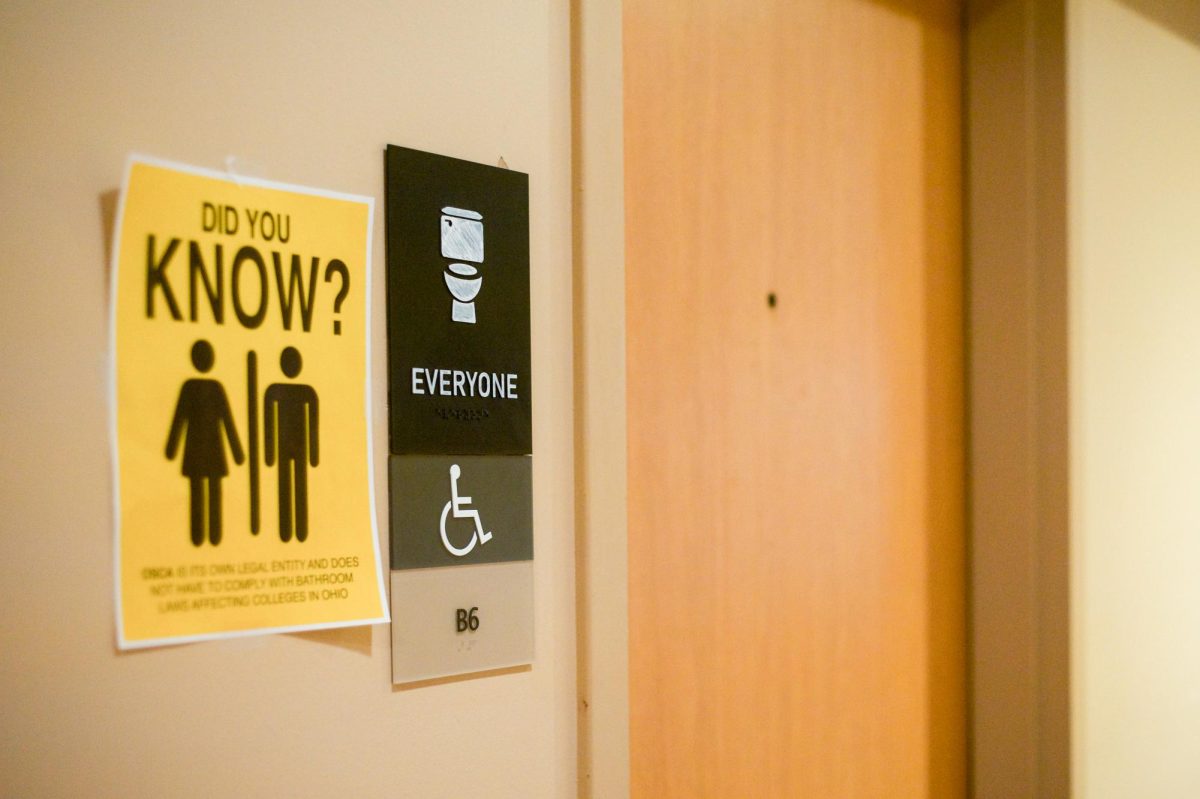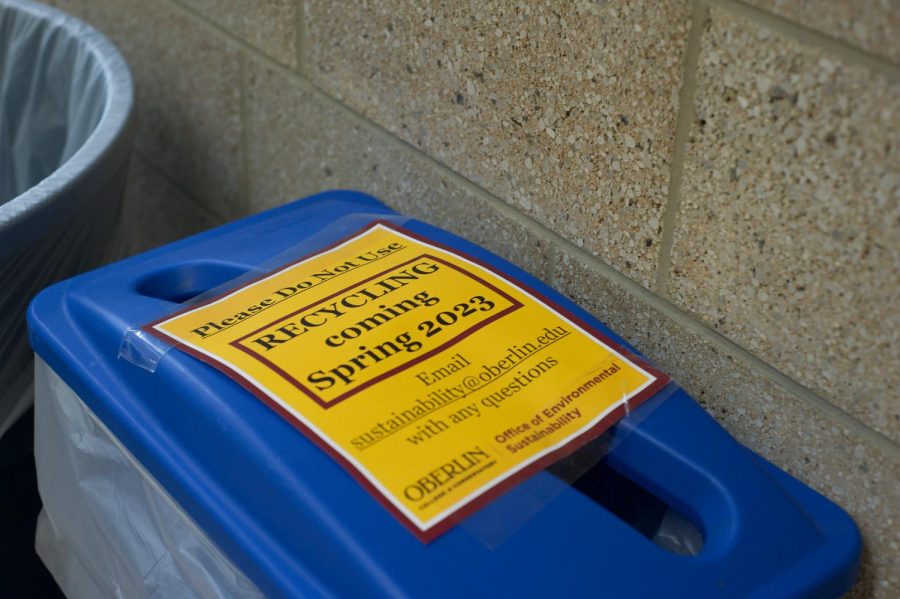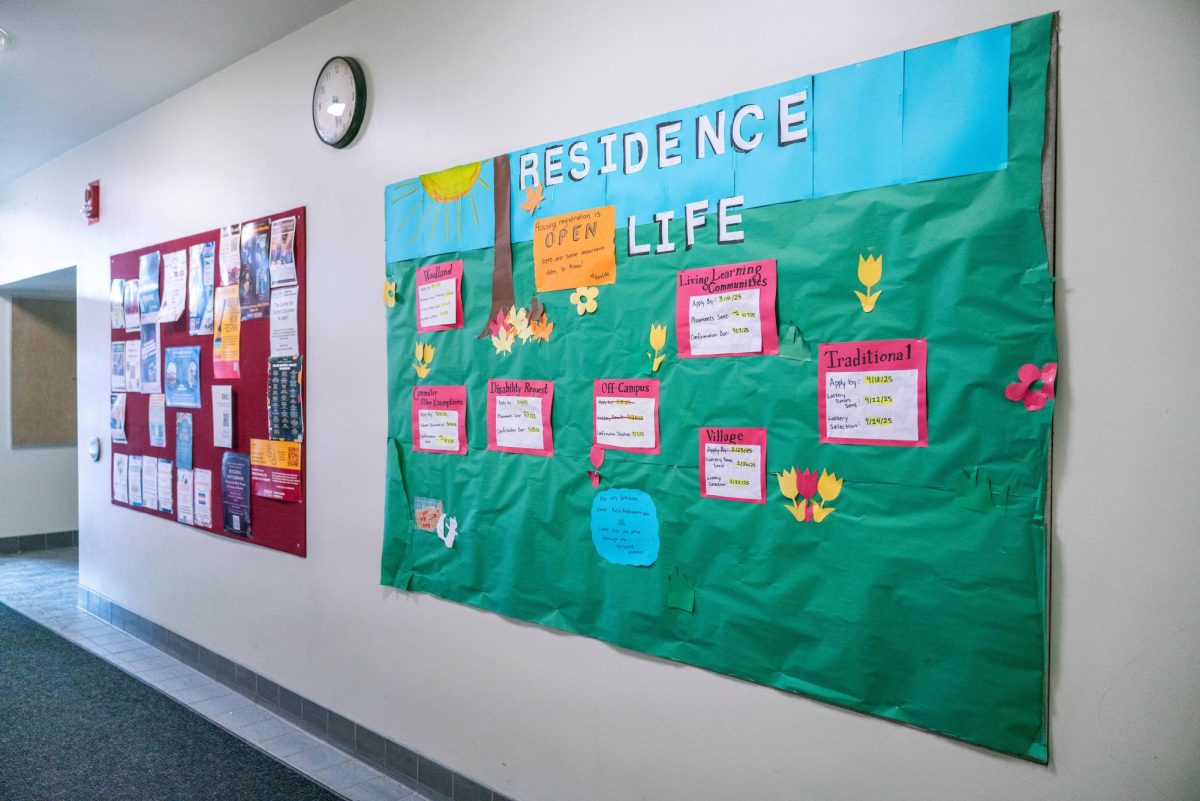On Feb. 1, abiding by the Feb. 25 deadline mandated in the law, the College officially finished implementing the changes necessitated by Ohio Senate Bill 104, colloquially known as the Bathroom Bill. The College maintains that it must obey the law or risk legal trouble that could lead to lawsuits or the revoking of accreditation, but student responses are split as transgender community members express anger, sadness, and fear.
The implementation of the Bathroom Bill has invalidated the E system previously commonly used in residence halls and made illegal the many multioccupancy unisex restrooms previously common across Oberlin’s campus. In compliance with the law, all of these multioccupancy restrooms were relabeled as either men’s or women’s rooms over the course of Winter Term.
According to the law, students must only use the restroom that corresponds with their binary sex assigned at birth. However, there is no mandated mechanism of enforcement for this specific stipulation, which the College seeks to emphasize.
“There is no Oberlin policy of enforcement other than we have to comply with the law, unless a complaint is filed of someone using a bathroom that doesn’t match their gender based on birth certificate,” Mark Zeno, assistant vice president and dean of Residence Life and Auxiliary Services, said. “I couldn’t imagine somebody walking around going, ‘I need to see your birth certificate.’ I don’t see our students doing that.”
For some students, though, the College’s compliance with the law is symptomatic of a disregard for the comfort and safety of transgender students.
“I’m here for the administration to be in good standing and have the College abide by the laws, but it is dehumanizing to have our right to choose stripped from us in a place that was considered a safe area,” Kaden Jarosz, a College first-year who identifies as trans, said. “Regardless of legislation, your college was your place you could exist, a safe spot.”
While the Bathroom Bill does impact the College, the Oberlin Student Cooperative Association, because of its status as its own legal entity rather than an institution of higher education, is not subject to this law.
“Fortunately, OSCA will not have to comply with the Ohio bathroom laws that are currently impacting the College and will continue our co-ed restroom policies,” College fourth-year and OSCA President Ani Zakarian said. “We are excited for this to be a moment in which OSCA can continue to solidify its place on campus as an especially welcoming environment for trans/gender non-conforming students.”
Almost immediately after the gendered bathroom signs were installed, students began to remove them from the walls, often damaging paint and drywall. Some signs have been replaced with 3D printed signs, reading “All Gender” or “Everyone,” and some students have printed replacement E system signs.
Zeno sent out an email Feb. 3 discouraging the removal of the signs and reminding students that this action is considered vandalism and is in violation of the Student Code of Conduct.
In an interview with the Review, he further clarified the College’s concerns about the sign removal, and pointed out that the burden of dealing with the damage falls on custodians.
“Vandalism is not the appropriate way to change,” Zeno said. “All that does is hurt our community. And that’s what I think outsiders get a chuckle out of — ‘How do we stir the pot, let them scurry around and make them go after each other?’ and that just hurts us.”
Among students, the responses to removing the signs in protest are mixed. Many students highlight concerns regarding the burden of repairing the walls and replacing the signs put on the facilities and custodial staff, also noted in Zeno’s email about the vandalism. But some students who voice these concerns also understand the frustration that inspires this action.
“I’m not against it if it helps to make people feel better,” Micah Zhu Kurcheis, a College first-year who identifies as trans said. “People are upset by this. I’m upset by this. And I don’t think it’s going to be harmful to the school if people keep removing signs.”
Zhu Kurcheis attended the dialogue event centered around the Bathroom Bill that the Office of Gender, Sexuality, and Attraction Initiatives organized Feb. 5, which was arranged to give community members a space to process their emotions and find community with other affected people, including staff, faculty, and Oberlin residents.
The event is one in a series of many arranged by the GSAI to support the trans community on campus, which will include a talk on the History of Transmisogynoir (Feb. 12), a GSAI Welcome Back Dance, events for Trans Day of Visibility (March 31), and the Trans Resource Fair.
Many trans students expressed appreciation for these events, but also frustration with the administration — for not pushing back on the law, for slow and unclear communication, and for a perceived lack of direct interaction with students.
On Jan. 14, mid-Winter Term, administrators held a webinar for faculty, staff, students, and parents to ask questions about the law’s implications for Oberlin.
Andrea Simakis, director of media relations for the College, wrote in an email to the Review that students had the opportunity to express questions and concerns at this event.
“At that webinar, Dean Goff encouraged those in attendance to reach out to her and Associate Vice President and Dean of Intercultural Engagement Kyle Williams anytime with questions and concerns,” Simakis wrote.
Simakis also emphasized that students could direct questions and concerns to the Center for Intercultural Engagement ([email protected]) and find official answers about the bill on the Ohio Law and Campus Restrooms FAQ page on the CIE website.
Still, Zhu Kurcheis said many students brought up frustrations related to communication during the dialogue event.
“People brought up the purposeful silence of the admin — I think I can call it that,” they said. “[The administration] has been very delayed in all the communications they put out, and all of the communications they have put out have been vague or not mentioned the bathroom bill at all.”
James Kirkland, a College fourth-year who identifies as trans, specifically noted the administration’s delayed communication following the S.B. 104’s signing. The bill was signed into law on Nov.27 2024, and the College administration first released an official statement on Dec. 11 2024, two weeks later. Dean Goff, who gave the statement on Dec. 11 and spoke with the Review a week before, maintains that the delay was to allow time to consult with the legal team tasked with interpreting the law’s implications.
Kirkland, soon after the Dec. 11 statement, was one of a group of students who attempted to organize a protest, titled “No Restroom for the Wicked,” Dec. 13 and Dec. 14 aimed at creating community and promoting organization and solidarity among trans students at Oberlin. The protest was to involve the singing of songs from Wicked, which Kirkland and his co-organizers said was meant to be in line with the history of queer sing-in protests.
However, the turnout was small, with only around 17 people according to Kirkland, and some trans Oberlin students expressed distaste for the event, which Kirkland and his co-organizers found disheartening.
“To have, as trans people, our best efforts at putting visibility on this issue to be dismissed and ridiculed so easily by other trans people, does not exactly build solidarity, build community, build any sort of confidence in the idea that there is a successful way to get the college to do anything about this,” Kirkland said.
Political scrutiny around trans citizens on the part of the federal government has continued to escalate since President Trump assumed office on Jan. 20. Trump issued an executive order stating that the government would only recognize two sexes on Jan. 20, issued a second order banning federal funding for gender affirming care for those under 19 on Jan. 28, and yet another banning transgender women from women’s sports yesterday, Feb. 6.
“We have this small group of people whose existence is a spotlight being shined on — [and] there’s no real demonstrable sense of solidarity, of community, of support from the student body, and no sense of support coming directly from the administration,” Kirkland said. “They say that politics is a pendulum, and for every swing one way, towards progressiveness, towards social acceptability, in the realm of LGBTQ+ visibility and rights, there’s going to be a backswing. It’s happening now. And where is the energy to think about it now?”












